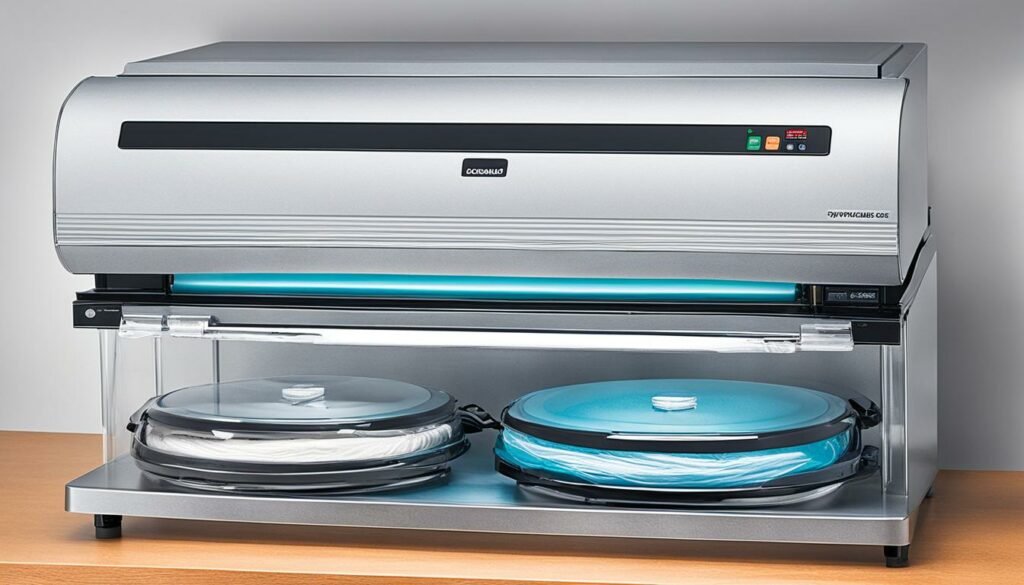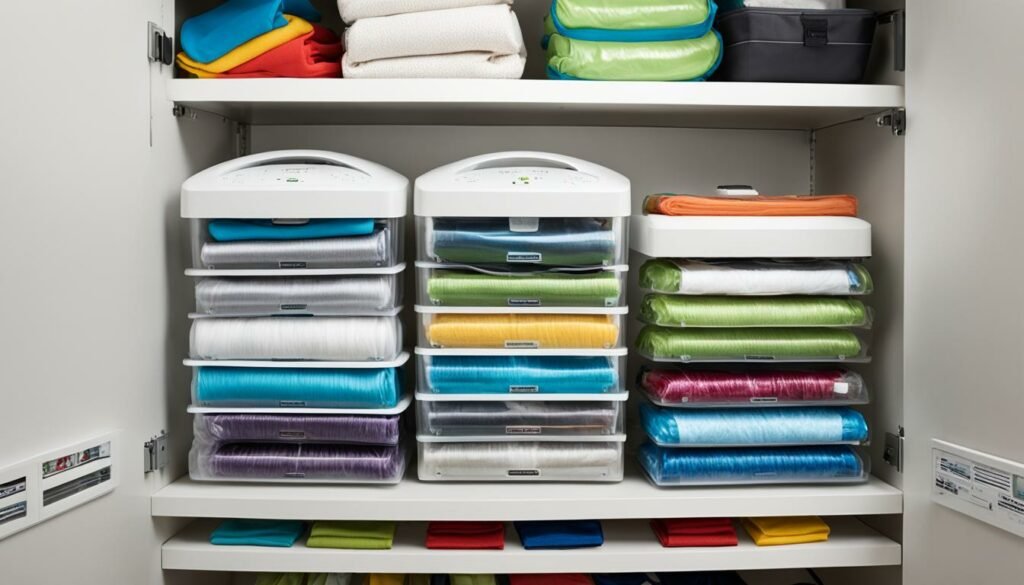There was a time we loved bringing fresh fish home from our trips. We’d vacuum-seal the fillets for later, looking forward to great meals. Sadly, some fish packages lost their seal because of the fish’s moisture. This taught us to store our vacuum sealer well.

Vacuum sealing machines are great for keeping food fresh. But like all appliances, they need good care. It’s really important to make sure the area you’re sealing is dry.
Dry plastic is key for a good seal. Keeping the top two to three inches dry before sealing helps a lot.
Also, wrapping damp foods, like fish, in cling wrap before vacuum-sealing can help. This reduces moisture and slime, which often cause seal issues. For more sealing advice, check out tips from pros in home food preservation.
Proper storage means more than keeping the sealer itself dry. It means avoiding places with too much moisture or extreme temperatures. Good storage solutions help protect your sealer and the food it keeps fresh.
By learning a few simple tricks, we can keep our vacuum sealers working well for a long time. Little details are important for our kitchen helpers’ care. They help us enjoy perfect sealing for years.
Explore more maintenance tips for better vacuum sealing success.
Understanding the Importance of Proper Storage
It’s key to store your vacuum sealing machine correctly. This keeps it working well and lasting longer. We all waste too much food, costing each household around $1,600 a year. By using vacuum sealers smartly, we can save a lot. They help keep foods like peppers and strawberries fresh for months. So, let’s see how the right storage helps our sealers stay strong.
Preserving Vacuum Sealer Effectiveness
Keeping your vacuum sealer effective is important. Use special bags and don’t reuse bags that held meat or fish. This stops food spoilage from bad seals. Always blanch fruits and veggies before sealing to keep them tasty. And yes, you can even seal liquids, but be careful not to let them leak. Tools like wide-mouth jar sealers help a lot.
Maximizing Lifespan of Your Vacuum Sealer
Making your vacuum sealer last longer is about when to stop sealing. If you see moisture, stop. It’s best to seal when everything is very dry to avoid weak seals. Big sealers make items smaller for easier storage. They also reduce stress on the sealer. For sealing liquids and delicate foods, chamber sealers are the best choice. These tips can help you use less food and spend smarter on big buys.
Don’t forget about the place you keep your vacuum sealer. Learn more about storing it right. This ensures it works well for a long time, making life easier.
Cleaning Your Vacuum Sealing Machine Before Storage
Preparing your vacuum sealer for storage is key to its performance and safety. Cleaning it right stops damage and makes it last longer.
Removing Residual Food Particles
Start by getting rid of leftovers to keep the sealer clean. Leftover food can bring bad smells and germs. Take off what you can and wash it with soap and warm water.
Wiping Down the Sealing Area
After that, wipe where it seals to get rid of dirt or oil. A clean seal area works best and you’ll avoid problems later. Check and clean the seal wire and Teflon tape too. If they’re messy or worn, get new ones.
Ensuring a Dry Sealing Area
Make sure everything is dry before putting it away. Wet spots can make the seal weak or start to grow mold. Use a dry cloth to dry it all. This is vital for keeping your vacuum sealer working well and lasting longer.
- Disassemble and clean removable parts separately.
- Wipe down the sealing area with a damp cloth.
- Inspect and clean the sealing wire and Teflon tape cover.
- Ensure all areas are thoroughly dried.
Follow these steps to keep your vacuum sealer in good shape whenever you store it. Regular care helps it work right and stay safe for storage.
Choosing the Right Storage Location
The perfect storage spot for your vacuum sealer is vital for its long life and work. Keep it in a good spot to always be ready.
Avoiding Moisture and Humidity
Too much wetness and humidity can really hurt your vacuum sealer. It can mess up the inside and make it less reliable. To pick the best spot for your sealer, choose somewhere dry and not too moist. Doing this helps keep the motor, electronics, and sealing parts working well over time.
Temperature Considerations
Vacuum sealers don’t like big changes in temperature. To keep yours happy, store it where the temperature is pretty much the same and mild. This could be a pantry, a cabinet, or any place that’s not too hot or cold. The Nesco VS-12 Deluxe Vacuum Sealer and many others will thank you for it by sealing food right, whether it’s dry or moist.

Storing your vacuum sealer right is the first step to its good performance. Keep away from too much moisture, wetness, and wild temperature changes. This way, you make the most of your sealer for storing food. For more help on picking the best sealers and how to keep them in good shape, check out reviews from Wirecutter.
Tips for Organizing Vacuum Sealer Attachments
Keep your vacuum sealer attachments neat to use kitchen appliances well. Sort them by type or how often you use them. This makes it easy to grab what you need, especially with everyday tools placed in simple-to-reach spots. Also, having specific spots for each piece keeps them safe and in order.
Use smart storage tips like labeling boxes to find items faster. This approach boosts tidiness and prevents harm. Another good tip is to keep the original packages, which helps you remember where things go. Custom storage options, made for your items, can also make your kitchen more tidy.
When saving money is important, think about creating bags that perfectly match your needs. This decreases waste and ensures everything has its own place. With these strategies, you can have a workspace that’s free from mess. These steps will keep everything in order and make using your vacuum sealer fun.